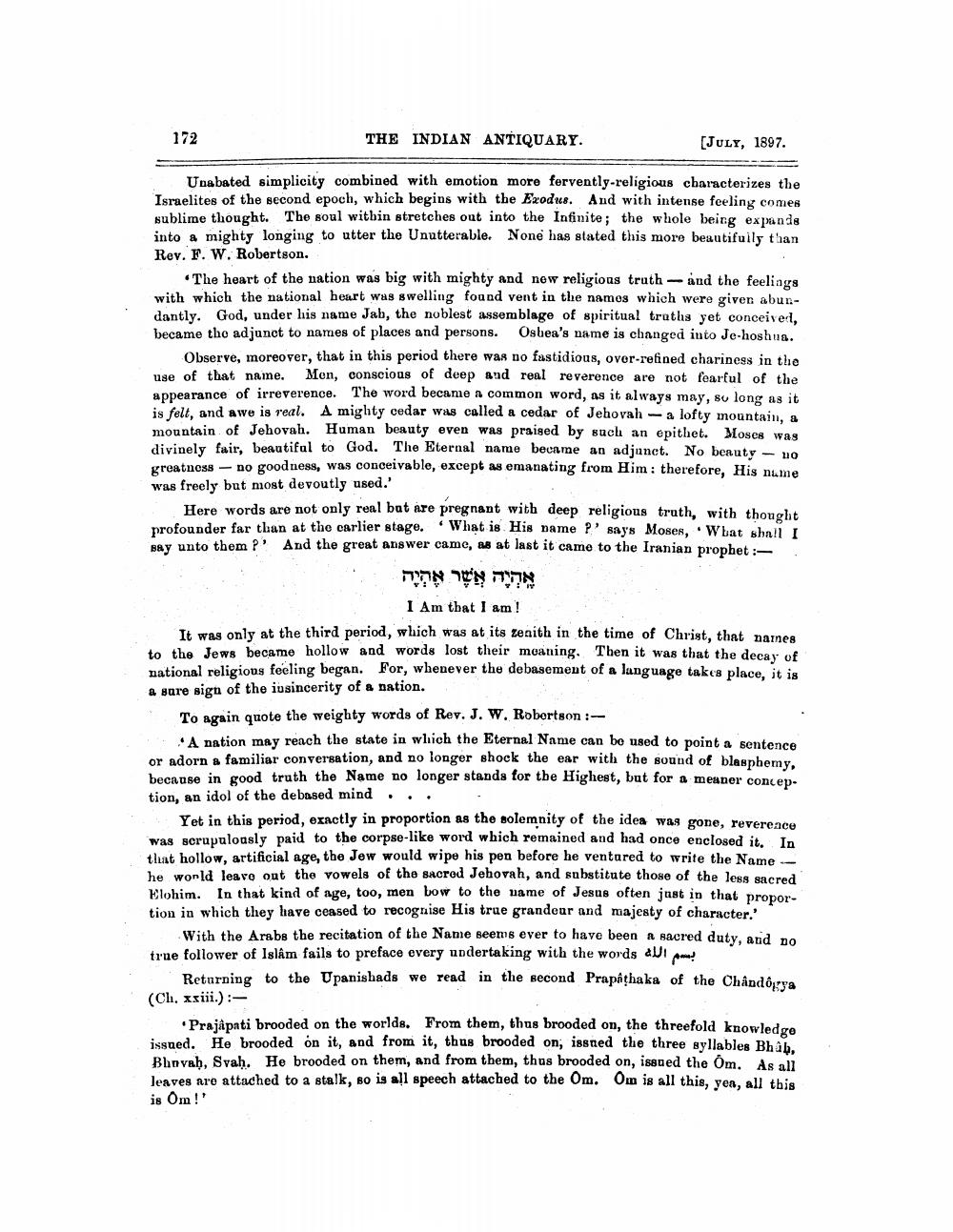________________
172
THE INDIAN ANTIQUARY.
[JULY, 1897.
Unabated simplicity combined with emotion more fervently-religious characterizes the Israelites of the second epoch, which begins with the Exodus. And with intense feeling comes sublime thought. The soul within stretches out into the Infinite; the whole being expande into a mighty longing to utter the Unutterable. None has stated this more beautifully than Rev. F. W. Robertson.
• The heart of the nation was big with mighty and new religious truth and the feelings with which the national heart was swelling found vent in the names which were given abundantly. God, under his name Jab, the noblest assemblage of spiritual traths yet conceived, became the adjunct to names of places and persons. Osbea's name is changed into Je-hoshua.
Observe, moreover, that in this period there was no fastidious, over-refined chariness in the use of that name. Mon, conscious of deep and real reverence are not fearful of the appearance of irreverence. The word became a common word, as it always may, su long as it is all and awe is real. A mighty cedar was called a cedar of Jehovah a lofty mountain, a mountain of Jehovah. Human beauty even was praised by such an epithet. Moses was divinely fair. beautiful to God. The Eternal name became an adjunet. No beauty - no vreatness - no goodness, was conceivable, except as emanating from Him: therefore, His nume Was freely but most devoutly used.'
Here words are not only real but are pregnant with deep religious truth, with thought profounder far than at the carlier stage. "What is His name p' says Moses, What shall I BAY unto them?' And the great answer came, as at last it came to the Iranian propbet :
אֶהְיֶה אֲשֶׁר אֶהְיֶה .
I Am that I am! It was only at the third period, which was at its zenith in the time of Christ, that na to the Jews became hollow and words lost their meaning. Then it was that the decay of national religions feeling began. For, whenever the debasement of a language takes place, it is a sare sign of the insincerity of a nation.
To again quote the weighty words of Rev. J. W. Robertson :
A nation may reach the state in which the Eternal Name can be used to point a sentence or adorn familiar conversation, and no longer shock the ear with the sound of blasphemy. because in good truth the Name no longer stands for the Highest, but for a meaner conception, an idol of the debased mind... .
Yet in this period, exactly in proportion as the solemnity of the idea was gone, reverence wa seruuulously paid to the corpse-like word which remained and had once enclosed it. In tlust hollow, artificial age, the Jew would wipe his pen before he ventured to write the Name - he world leave out the vowels of the sacred Jehovah, and substitute those of the less acred Elohim. In that kind of age, too, men bow to the name of Jesus often just in that proportion in which they have ceased to recognise His true grandeur and majesty of character.'
With the Arabs the recitation of the Name seems ever to have been a sacred duty, and no true follower of Islâm fails to preface every undertaking with the words alle!
Returning to the Upanishads we read in the second Prapathaka of the Chándorya (Ch. xxiii.) :
Prajapati brooded on the worlds. From them, thus brooded on, the threefold knowledge issued. He brooded on it, and from it, thus brooded on, issned the three syllables Bhab. Blnvah, Svah. He brooded on them, and from them, thus brooded on, issued the Om. As all leaves are attached to a stalk, so is all speech attached to the Om. Om is all this, yea, all this is Om!'




